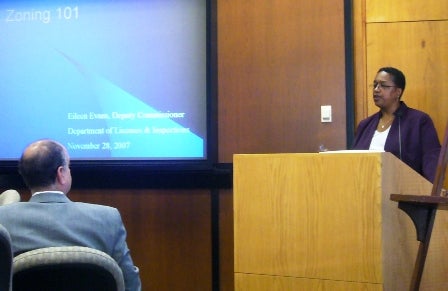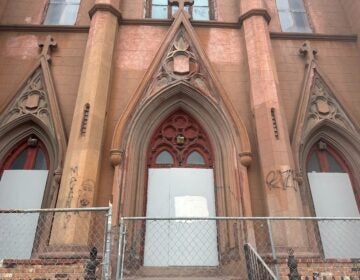How red tape has also wrapped up L&I

Nov. 28
By Matt Blanchard
For PlanPhilly
How do you spell frustrating bureaucracy? If you’re a developer trying to build in Philadelphia, you might be tempted to spell it L&I.
Fairly or unfairly, the city Department of Licenses and Inspections often gets fingered as “the real problem” when Philadelphians get together to discuss the much-needed reform of our development approvals process. Slow reviews. Unpredictable outcomes. Red tape. All are casually laid at the door of L&I.
But speaking before the Zoning Code Commission on Wednesday, L&I Deputy Commissioner Eileen Evans suggested the myth of bureaucratic incompetence is just that – a myth. The agency’s staff of nearly 400 are just as trapped in the current system as any delayed developer.
“L&I does not make the law,” Evans said. “L&I does not change the charter.”
Down at the L&I counter on the concourse level of the Municipal Services Building, Evans said her staff of 10 plans examiners must deal with no less than 3,700 zoning and permit applications each month. Efforts to hire new plans examiners with engineering degrees are somewhat stymied by the civil service regulations.
“Dealing with the civil service system is as hard as, I guess as hard as what you all think what you think about dealing with L&I,” Evans joked.
Projects encounter serious delays when they must secure approvals from three or more separate agencies in addition to L&I, Evans said. Plans for a one-story furniture warehouse, for example, might get shuttled from L&I to City Planning, to the Water Department, back to City Planning, the Streets Department, the Art Commission, back to L&I and finally to the Zoning Board of Adjustment.
Far from criticizing the agency, several members of the Zoning Code Commission responded with sympathy. Some of the run-around, they said, is unavoidable in any engineering project as complex as urban development.
“This is no different a process from any engineering process in any suburb anywhere else,” said prominent zoning attorney Peter Kelsen.
Reforms are underway, Evans said: Maps have been computerized. The concourse has been reorganized.
The critical question, Evans said repeatedly, is whether the Zoning Code Commission should be attempting to enact bureaucratic reforms in addition to re-writing the code. Her answer to that question was clearly “no”; the ZCC should stick to zoning.
Describing the code as a “melting pot” of good and bad ideas from the 1930s, 1950s, and 1990s, Evans suggested the ZCC would have its hands full without approaching bureaucratic reorganization.
Planning Commission director Janice Woodcock agreed: “I do think we need to focus on the code. The larger question of the development review process is not within the mission we’ve been asked to do.”
No one disagreed, which suggests much of the “streamlining” of development in Philadelphia promised by reform advocates will have to come from somewhere other than the ZCC.
Matt Blanchard is a former Inquirer reporter. Contact him at blanchard.matt@gmail.com
WHYY is your source for fact-based, in-depth journalism and information. As a nonprofit organization, we rely on financial support from readers like you. Please give today.






